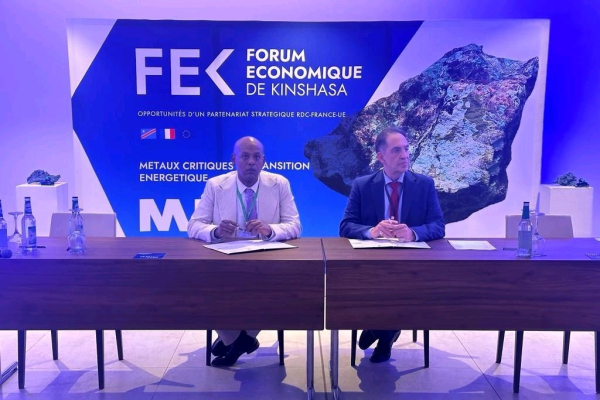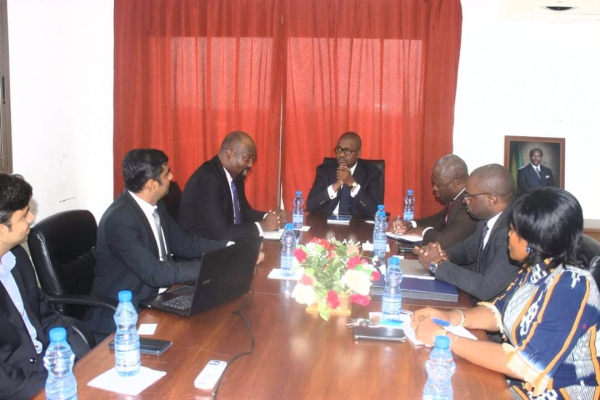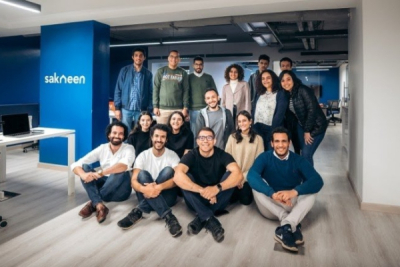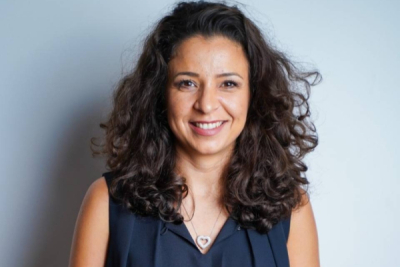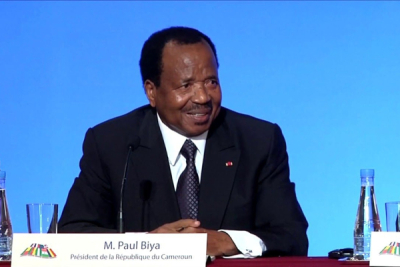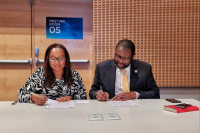The Democratic Republic of Congo is one of the African countries with the largest rural-urban connectivity gap. In that context, the post-Covid-19 growth in demand for broadband connectivity coupled with the country’s large population is attracting local and foreign investments in the digital sector.
In the coming months, more than 2.5 million people living in the eastern regions of the Democratic Republic of Congo (DRC) will benefit from a faster, cheaper, and more reliable internet connection. A financing agreement to this effect was signed on Saturday, March 4, between the European Investment Bank (EIB) and Bandwidth and Cloud Services Group (BCS).
Under the agreement, BCS will receive $10 million to deploy 1,200 km of fiber optic cable out of the 20,000 km that it plans to install in Southern, Central, and Eastern Africa over the next three years.
The investment will help connect areas with poor or no access to broadband internet. It will create jobs and connect 319 schools and 70 hospitals and health centers. According to Yonas Maru (photo, left), founder and CEO of BCS Group, it "will go a long way to ensure implementation of the MOU between the Government of DRC and BCS to connect over 1,900 schools, 1,640 public hospitals and government institutions along the BCS backbone and metro fiber infrastructure."
“The Digital is such a powerful driver of equity, inclusion, and growth, that the EU has made it a pillar of our Global Gateway strategy. Expansion of the fiber-optic infrastructure will enable local communities, schools, and hospitals to benefit from mobile broadband, which ultimately means new opportunities for learning, business, jobs, and healthcare,” said Thomas Östros, Vice-President of the European Investment Bank.
The funding was officially announced last November at the AfricaCom 2022 in Cape Town, South Africa. It is the EIB’s first quasi-equity investment and its second cooperation with BCS. In 2018, the institution provided an $18 million long-term loan for BCS.
Samira Njoya
To accelerate the implementation of its 2021-2023 digital transformation strategy, Gabon initiated several projects including the construction of a national data center. The offer made by the Indian businessmen includes the designing, construction, and maintenance of those infrastructures.
Last Thursday, Gabon’s Digital Minister Jean Pierre Doukaga Kassa welcomed a delegation of Indian businessmen from the Shapoorji Pallonji group who expressed their interest in the Gabonese digital sector.
On social media, the Ministry of Digital Economy said that the businessmen "offered their expertise in the design, construction, and maintenance of digital infrastructure, including data centers.”
The group also presented the projects it completed in Egypt, Ghana, and the Democratic Republic of Congo. They also exchanged with the Minister on the extension of the national backbone to three of Gabon’s provinces. The backbone projects discussed include a 623 km network between Lambaréné, Mayumba, and Doussala on the border with Congo-Brazzaville.
The Minister of Digital Economy then instructed his collaborators both in the central administration and the state companies under his supervision to analyze the Indian businessmen’s offers.
The construction of a national data center is one of the Gabonese government's flagship projects for the management and storage of its data. According to the news website Le Nouveau Gabon, the Indian businessmen’s visit comes after a meeting between the Gabonese Ministers for Investment Promotion and Digital Economy to discuss the construction of that national data center.
Despite being a fast-growing sector in Africa, real estate faces inherent challenges. To address some of these challenges, tech entrepreneurs are beginning to step in with interesting solutions.
Sakneen is a proptech solution developed by an Egyptian startup. It allows users to buy, sell or rent a home.
Through its web platform, a user can create an account to view available properties on a map, along with accurate valuations that reduce the stress of long negotiations.
The valuations are “based on a unique pricing algorithm that […] brings information & transparency to the real estate industry in Egypt. We collect over 30 unique data points per home to ensure that our benchmarks are a relevant starting point for conversations between sellers and buyers,” the web platform explains.
The solution provides both buyers and sellers with all the information they need to complete real estate transactions. It allows buyers or renters to easily find properties that meet their search criteria and budget.
According to Omar Khashaba, Principal at Egyptian venture capital fund Algebra Ventures, " Sakneen brings unique efficiencies to the real estate market, which despite heavy VC funding, hasn’t seen enough disruption. Trying to find a home online today is often a frustrating experience, plagued by inaccurate listings and overzealous brokers. [It] can meaningfully differentiate itself by re-inventing the search experience and managing the supply side in novel ways." In 2020, the Egyptian proptech behind the solution participated in the Y Combinator acceleration program. From its inception in 2019 to date, it has raised about $1.3 million to accelerate its growth.
Adoni Conrad Quenum
She is an entrepreneur and digital transformation consultant who has initiated several projects to support the Tunisian tech ecosystem. Betacube, her latest venture, helps entrepreneurs build their startups.
Amel Saidane (photo) is a Tunisian entrepreneur and venture builder. She holds a Master's degree in Electrical Engineering from the Leibniz University of Hannover, Germany (2003) and a Master's degree in Digital Economy from the University of Maryland, USA (2007).
She entered the professional world in 2004 when she joined the IT company Nokia as an Account Manager. In 2008, she joined Microsoft as an Enterprise Account Manager before becoming Managing Director of the consulting agency SlickStone. Between 2016 and 2018, she was the Seedstars Ambassador in Tunisia.
In 2017, she co-founded Tunisian Startups, a network of entrepreneurs that aims to create a friendly environment for successful and budding entrepreneurs alike. She is currently the president of the association. Two years later, she also co-founded Digital2Value (D2V), a platform that aims to accelerate digital transformation by connecting small and medium-sized enterprises (SMEs) to a comprehensive ecosystem of consultants, development organizations, and digital solutions.
D2V has three flagship products. The first is the D2V Digital SME Accelerator, a six-month program that enables SMEs to accelerate their growth by leveraging digital transformation. The second is D2V Market Place, a platform that connects startups. The third product is D2V Studios, a place for entrepreneurial skills development and startup development.
Her most notable startup is Betacube, of which she is a co-founder and CEO. Founded in 2019, Betacube is a venture builder supported by the European Union and Expertise France. It invests, builds, and develops B2B startups in the financial and mobility sectors. Its vision is to create a technology innovation ecosystem where Tunisian and international talent can connect with the world, build successful businesses and drive digital transformation in specific industries. According to Ms. Amel, Betacube supports entrepreneurs from ideation to validation, then to initial funding, and takes stakes in the startups created. In 2022, she revealed that the venture builder has 12 startups in its portfolio.
Amel Saidane is also a member of the advisory board of the United Nations Economic Commission for Africa, a member of the startup selection committee of the Tunisian Ministry of ICT, and a member of the Responsible Leaders Network of the BMW Foundation. She also sits on the board of the Digital Arabia Network. In 2022, she was named on Ventures Africa's list of the twelve North African female tech founders to know.
Melchior Koba
This officialization marks the beginning of a digital process announced in July 2022.
Last Thursday, Cameroonian President Paul Biya (photo) signed a decree updating the conditions of entry, stay and exit for foreigners in Cameroon.
According to the said decree, obtaining an electronic visa requires the prior submission of a visa application on a dedicated website that will soon be launched. The application can be made, regardless of the geographical area of the applicant, following established administrative and financial terms.
After the application, an online visa authorization will then be issued to the applicant who will then be able to go either to a diplomatic mission or to a border post to formalize the visa. This final phase will be completed with an enrolment process consisting of taking fingerprints and photographs. According to the decree, the visa is issued within three days after the online application.
The e-visa project is part of the Cameroon Digital Strategic Plan. In June 2022, the government received the computer equipment that was to serve in the project, which will be implemented by the Abidjan-based firm Impact Palmarès R&D SAS. The bill updating the legal framework for entry, exit, and stay in Cameroon was submitted to the National Assembly on July 2, 2022.
The implementation of the e-visa project will help centralize and protect data, control entries, and exits and monitor the revenues generated by the government from visa applicants, who will now pay the fees online.
In July 2022, Minister for Foreign Affairs Lejeune Mbella Mbella indicated that the e-visa will also save time and costs for users since it will address two of the grievances always pointed out by foreigners seeking Cameroonian visas. Namely, it will end both the long trips to embassies and the long queues involved.
Samira Njoya
She has over seven years of experience in the e-commerce industry. Her resume boasts experience in several e-commerce companies and financial institutions.
Mame Fatou Ba (photo) is a Senegalese businesswoman with experience in e-commerce and management. The Polytechnic University of Hauts-de-France and the University of Lille graduate is now the general manager of Yoonema, a digital marketplace that gives sellers access to a secure online store, easy payment options, and marketing tools.
Appointed in March 2022, she is expected to contribute her experience to grow the marketplace, which currently boasts more than 1,000 clients. In February 2023, while presenting the marketplace she is now leading, Mame Fatou Ba said: “Yoonema aggregates the different stages of the merchant-buyer journey from first contact to the completion of a transaction and beyond, through continued marketing and customer outreach. We simplify the experience for both the seller and the customer by closing the transaction facilitation gap. Furthermore, Yoonema offers a secured payment platform that builds and reinforces trust in the buyer-seller journey, while mimicking the day-to-day payment landscape known to customers, and also providing payments with major credit cards to suit our already established international customer base.” About a month earlier, the marketplace was selected for the third edition of the Africa Startup Initiative Program (ASIP), which entitles it to $18,000 in equity funding and $750,000 in credit, services, and in-kind benefits.
Mame Fatou Ba joined Yoonema in January 2023 as a senior program manager. Her professional career, however, began in 2011 at B2B service company Asepex, where she was an intern in the textile and handicraft department. In 2012, she also interned at the IT company Soft Solutions as an international marketing assistant.
After an internship in the trade department of Ecobank Senegal and another as a sales assistant at UBA Group in 2013, she was hired by ouiCarry, a freight forwarding company, as a customer service agent. In 2014, she was promoted to director of sales and customer services. After leaving ouiCarry, she freelanced as a consultant and business manager for e-commerce companies before joining Yoonema.
Melchior Koba
The solution was launched by Jean-Fabrice Gnohi, the owner of a tourism company in France. Besides allowing users to rent cars, it also allows car owners to earn money by renting out their cars.
Monbolide is a digital solution developed by an Ivorian startup. It allows users to easily rent luxury cars.
Through its mobile applications -available for Android and iOS devices, users can create the accounts they need to access the cars available for rental. Besides the account, there is no requirement or step to take to be able to rent cars with Monbolide.
The solution lists cars for every budget. For instance, the 2016 Mercedes costs CFAF150,000 (about $244) daily, while a Range Rover Sport can be rented at CFAF250,000 per day, and a 2011 Peugeot at CFAF30,000 per day.
Users can also book the specific brands they need. In this case, they need to provide information like the location, and the rental start and end dates.
The solution also allows individuals to rent out their cars. They just need to follow the required process. Thanks to one of Monbolide’s partners, they can install a tracker in their cars to know their positions at any time. Currently, Monbolide only operates in Côte d'Ivoire but it plans to expand to other West African countries.
Adoni Conrad Quenum
Nigerian universities train thousands of talented young people every year. However, most of them lack the valuable experience and knowledge to engage in technology entrepreneurship after college.
Last Wednesday, The Nest Innovation Technology Park, a Nigeria-based community that fosters tech startup innovation, launched the “Netlings Playbook,” a program designed to give university students access to the resources they need to explore digital entrepreneurship.
By giving access to the resources, the pioneer program, launched in partnership with Campus Innovation Circles (CIC), wants to allow beneficiaries to gain valuable experience and knowledge without significant risks.
“We believe that student entrepreneurs have the potential to create groundbreaking solutions to everyday problems. With The Nestlings Playbook’s innovative program, we’re empowering them to unleash their full potential and make a real impact in the African entrepreneurship ecosystem,” said Joba Oloba (photo, right), one of the co-founders of The Nest Innovation Technology Park.
For Nest, the Nigerian student ecosystem has numerous talented individuals but, there is a need to provide those individuals with the tools and resources to transition into the digital economy as entrepreneurs and not as primarily working-class talent. The goal is to “contribute to Africa’s transition to a digital economy through youth engagement.”
According to Toyin Bamidele, the lead, and coordinator of the Nestlings Playbook, the program is “one of the biggest collaborations to support founders across university communities exploring digital entrepreneurship to create prosperity.” The flagship program will launch with university communities and a call for applications will open in March 2023.
Samira Njoya
In Africa, the development of mobile telephony has greatly impacted critical sectors, including healthcare. By leveraging its technologies, the GSMA and Africa CDC want to improve the lives of millions of people and improve disease control.
Last Wednesday, the GSM Association (GSMA) and the African Centre for Disease Control and Prevention (Africa CDC) signed an agreement to harness the power of mobile to fight disease in Africa.
Under that agreement, the GSMA will work closely with Africa CDC on HealthConnekt Africa, a bold new initiative to connect all health facilities and personnel in Africa to the Internet by 2030.
“Bringing together expertise and resources will help establish a powerful new infrastructure, providing African healthcare workers access to the information they need in a timely fashion and the intelligence necessary to help prevent the spread of disease across international borders,” said Angela Wamola (photo, left), GSMA Head of Sub-Saharan Africa.
HealthConnekt Africa will begin with a small group of pioneering African Union member countries and communities. In the pioneering countries, health facilities will be connected to the Internet, and health workers equipped with smart devices that will allow them access to critical online resources to improve the quality of care provided to patients.
Over the past two decades, Africa has recorded phenomenal growth in mobile adoption. According to the World Bank and the African Development Bank, Africa had 650 million cell phone users in 2013, more than the users in the United States or Europe. At the same time, Swedish telecommunications group Ericsson indicates that Africa’s smartphone penetration will reach 70% by 2024.
Samira Njoya
Since 2020, the number of edtech startups operating in Africa has been growing steadily. Their adoption is also rising due notably to the alternatives they offer, allowing learners to learn at their own pace and make better use of their time.
Mara Academy is a digital platform developed by a Beninese start-up. It allows users to access online training in various fields, including digital marketing and social media management.
The edtech startup behind the app is based in Cotonou. It was founded in 2021 to offer every African a unique learning experience. Its digital solution has no mobile app for the time being. To submit applications for one of the training courses it offers, users have to visit its web platform and fill out a dedicated form. Once an application is accepted, the applicant has to take an entrance test. After the test, there is a third step, which consists of an interview with the startup’s team and the signing of enrollment documents.
To be accepted for its courses, applicants need to meet certain conditions. They must be 18 to 30 years old, live in Benin, Togo, Niger, or Côte d’Ivoire, be unemployed, be available for training and employment, and have at least two years of higher education.
Mara Academy wants to give quality education to every African. It also wants to serve as a bridge to the labor force. This is why it set up the Youth Employment Accelerator YEA program. This program allows users to get trained and pay when they get employed. "No loans, no hidden fees. We get paid when you get paid. After you get your job you will pay us 30% of your salary over 12-24 months," its platform reads.
Through partner companies, it helps learners land a decent job after a 52-week training. In addition, throughout the training, learners spend time in companies where they each have mentors who follow their progress.
Adoni Conrad Quenum
More...
He is a business leader experienced in digital payments, channel development, and market segmentation, among others. He will contribute his expertise in those fields to further develop Cellulant.
Ibrahim Gbolahan Aminu (photo) is the new general manager of Cellullant Nigeria. The Obafemi Awolowo University graduate was appointed to this position on February 23, 2023.
Cellulant is a pan-African payment company that provides alternative and locally relevant payment methods for global, regional, and local merchants. The company operates in 18 African countries, with a payment platform that connects thousands of businesses to 154 payment options in 35 countries. The platform handles the payments of some 220 million consumers on a single, inclusive network.
As the new head of Nigerian operations, Ibrahim Gbolahan Aminu will oversee the day-to-day operations and lead the national expansion of Tingg, Cellulant's digital payments platform.
Commenting on his appointment, the general manager said: “I am honored to join the team of innovative thinkers at Cellulant and I am eager to bring my expertise to the table to enhance the payments landscape in the country. I am confident that our efforts in increasing the quality of services and products we offer our customers will lead to greater financial inclusion, accessibility, and stability for all Nigerians.”
His professional career began in 2002 at Adol Pharmaceutical Industries when he was hired as a Senior Sales Officer. In 2006, he joined the Nigerian Gas Company Limited as a budget officer. Two years later, he was appointed Market Segment Manager by Bank PHB Plc. In 2011, he joined Keystone Bank Limited as Product Manager. Then, in 2014, he became head of communications channels and services for Interswitch Group, an integrated digital commerce and payments company focused on Africa. After a month in this role, he was promoted to Head of Partner Channels.
Before his appointment at Cellulant, between 2021 and 2022, he was the general manager of VigiPay, where he managed the company's cross-border payment platform.
Melchior Koba
Last December, the Biden administration announced $55 billion of new investments in Africa, including plans to expand digital access on the continent. About two months after that announcement, some projects are underway.
Last Friday, U.S. tech company Cisco announced a memorandum of understanding with the Thabo Mbeki Foundation for the realization of several projects, including the construction of a technology and education center in Johannesburg, South Africa.
“Prioritizing digital skills in young people is the first step to realizing South Africa’s potential as a forward-facing, technological powerhouse. We must step up our efforts to give learners the resources and support they need to become digitally savvy and inspire them to explore the potential of the technology they’re using,” said Smangele Nkosi, General Manager of Cisco South Africa.
Under the memorandum, Cisco will digitize the center’s end-user experience, sustaining and automating the infrastructure, cloud operations, data center, and implementing a holistic technology strategy that will position the center as a world-leading information and training repository.
In December 2022, at the U.S-Africa Summit, Cisco Systems announced a $200 million in-kind contribution to Africa for resources such as programs, tools, schools, and instructors. The U.S. company said the contribution would, among other things, extend digital skills and cybersecurity training to 3 million Africans.
So, in addition to the technology center, Cisco will build a digital skills platform that will complement the Thabo Mbeki Foundation's education programs and offer international certifications in cybersecurity, an in-demand skill that is essential for South Africa's digital transformation.
Samira Njoya
A physician by training, she served her country for 20 years before launching a healthtech startup that leverages artificial intelligence to detect and treat diseases.
Jaishree Naidoo (photo) is a South African pediatric radiologist and one of the pioneers of pediatric radiology in her country, graduating from the University of Cape Town in 2010. In 1999, she got a bachelor's degree in surgery from the Medical University of South Africa.
After a one-year internship at King Edward 8th Hospital in 1999, she served as Chief Medical Officer at Johannesburg General Hospital in 2000. The following year, she held the same position at Chris Hani Baragwanath Hospital before going back to the Johannesburg General Hospital as a radiology registrar. Four years later, in 2005, she joined the Donald Gordon Medical Center as a part-time radiologist.
In 2008, she was appointed as a Senior Radiology Specialist at the Chris Hani Baragwanath Hospital. From 2009 to 2010, she was a Pediatric Radiology Fellow at the Red Cross War Memorial Hospital before joining the Sandton Medi Clinic as a Radiology Specialist. In 2011, she was appointed head of pediatric radiology at Charlotte Maxeke Hospital, and in 2017, she became head of radiology and chair of the academic committee at Nelson Mandela Children's Hospital.
Aside from her fulfilled professional career, Dr. Jaishree Naidoo is also a tech entrepreneur. In 2019, she co-founded Envisionit Deep AI, a healthtech startup she is leading as the CEO.
The startup uses artificial intelligence to streamline and improve medical imaging diagnosis. It designs various products including the Radify AI platform, which is said to provide fast, accurate, high-quality, and affordable medical imaging diagnostics needed to detect and treat diseases.
“RADIFY for chest x-rays was developed primarily because pneumonia is the number one cause of morbidity and mortality in children under the age of 5 in Africa.
A senseless statistic when it is a disease that is so easy to treat. With RADIFY, diagnostic healthcare can be made available where there is a lack of specialist expertise,” Dr. Naidoo explained in 2021.
The CEO is also a notable conference speaker. She has been invited to speak and chair sessions at many local and international radiology and healthcare conferences, such as the 2020 Forbes Women Africa event, where she was one of the speakers.
According to Forbes, Dr. Naidoo is one of “UK-Africa’s Top 15 African Female Tech Founders and as such was honored by MPs at the UK Houses of Parliament in January 2020 in London.”
In 2020, her startup, Envisionit Deep AI, won two categories (Healthtech and social impact) at Apps Africa Innovation Awards. It was also one of the Season 2022 Regional Winners of the African Startup Awards. On February 23, 2023, it raised $1.65 million to continue its development in South Africa and beyond.
Melchior Koba
After his studies in the UK, Libyan-born Ammar Hmid returned to his home country to set up a food delivery startup. A few years later, despite the challenges it is facing, the startup is proving to be a useful tool for populations in Tripoli.
Presto Eat is a digital solution developed by an eponymous Lybian start-up, based in Tripoli. It allows its users to have food and groceries delivered.
Through its mobile app -available for Android and iOS devices, its users can create their accounts to access the listed restaurants, place orders and get them delivered anywhere in Tripoli and its surroundings.
Presto Eat claims more than 250,000 orders delivered since its launch. The startup behind it employs more than 500 Libyans. It also has 13 stores and departure points in Tripoli and over 380 partner businesses that use its services. Thanks to its departure points, it ensures fast deliveries and allows users to monitor the state of the deliveries in real-time.
According to PlayStore’s data, the Android version of its application has been downloaded over 100,000 times. Despite this success, Presto Eat is struggling to attract investors. The reasons cited include the political instability, in the country since 2011, and the lack of a proper technological ecosystem in the country. Nevertheless, the startup wants to extend its services to other cities in the country, namely Benghazi and Misrata.
For the time being, this expansion plan is just hopeful wishes for Presto Eat founder Ammar Hmid who points at investors’ seeming disinterest in the Libyan tech ecosystem. “We want to be the app for everything for Libyans. […] But […] Despite the growth, VCs and other investors aren’t keen on investing in the business. The ones that replied wanted me to do risk analysis on the Libyan market for them. But that’s not my job, my job as a founder is to grow my business. [Also], Libyans don’t have a strong startup mindset because there are other profitable sectors to work and invest in, like importation and FMCG, or even civil service,” he told TechCabal earlier this month.
Adoni Conrad Quenum


